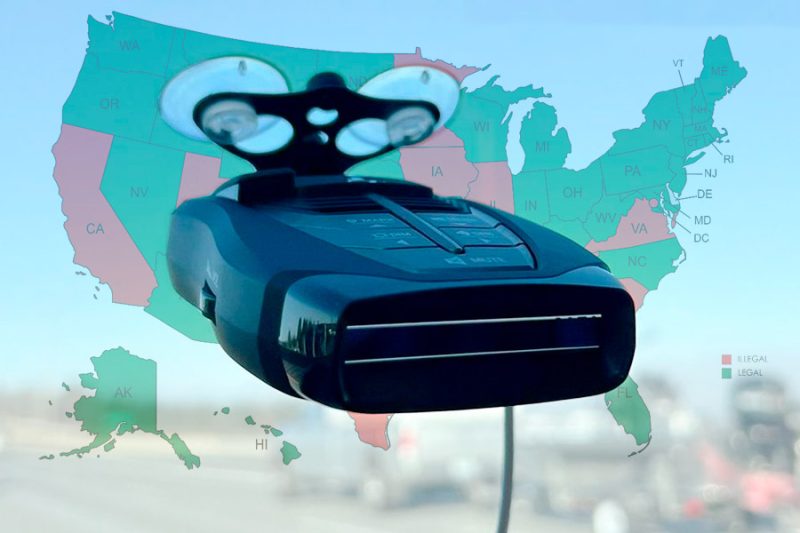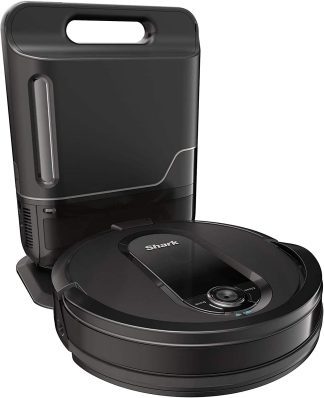Picture this: You’re cruising down Florida’s picturesque coastline, the sun setting on your left, and that dreamy vacation playlist humming in the background. Then suddenly, you see those flashing blue lights in your rearview mirror – a speeding ticket waiting to happen! In such moments of dread, one question might pop into your mind: are radar detectors legal in Florida?
You’re not alone if you’ve ever pondered this question while driving through The Sunshine State. After all, nobody likes surprises when it comes to traffic fines.
Intrigued? Buckle up as we take a deep dive into the legality of radar detectors within Florida borders. We’ll explore their role against laser jammers, understand how federal laws come into play for commercial versus non-commercial vehicles and even touch upon privacy concerns related to these devices.
Put an end to the hassle of searching. With this option, you can quickly locate what you need without any trouble.
Radar Detectors in Florida: Understanding the Legalities

If you’re a motorist in Florida, knowing your rights and responsibilities when it comes to radar detectors is crucial. Yes, radar detectors are legal in most private vehicles within the Sunshine State. However, there are further nuances to be aware of.
In general, these handy devices can alert drivers about law enforcement’s use of radar guns ahead, giving them time to adjust their speed accordingly. However, for commercial vehicle operators or anyone behind the wheel of a vehicle weighing over 10,000 lbs., using a radar detector isn’t an option – they’re considered illegal under state laws.
This rule also applies nationwide as per federal regulations. If you’ve got questions regarding this matter or have been slapped with a speeding ticket despite having one installed in your ride, consulting with a Miami-based defense attorney who specializes in reckless driving cases might be worth considering. Here’s where you can get professional help.
Understanding Radar Detector Laws in Florida
Florida has its own unique take on what makes radar detection devices either legal or illegal. In contrast to states like Virginia and Washington DC where usage of such equipment is banned outright regardless of whether it’s for personal use or not.
The law permits standard radar detectors but takes issue with other forms like laser jammers, which aim at interfering with police officers’ efforts at clocking speeds accurately through both laser guns and radars—those are big no-no’s here. So if you’re thinking about installing one, just remember that crossing this line could land yourself into hot water quickly.
The Importance of Radar Detectors and Laser Jammers
Driving is a responsibility. As motorists, we want to avoid tickets not just because they’re expensive, but also because safe driving protects us all. Radar detectors and laser jammers can provide a useful aid in avoiding tickets by alerting drivers to police radar use nearby.
Radar detectors alert drivers when police radars are in use nearby. These devices allow us time to check our speed and adjust if necessary before encountering law enforcement. However, some folks misunderstand the purpose of these gadgets – they aren’t a license for reckless speeding.
Laser jammers work differently from radar detectors; rather than detecting police lasers, they disrupt them by sending out signals that confuse the laser guns. But let’s be clear here: using these devices doesn’t mean you can go full Fast & Furious on public roads. It’s always essential to maintain responsible speeds regardless.
The Statistics Behind Speeding Tickets
You might ask yourself why bother with such technology? The answer lies in surprising statistics: about 25% of all speeding tickets issued due to radar errors. Yes, even machines make mistakes. That being said, it makes sense why many drivers invest in both radar detectors and laser jammers as safeguards against potential false alarms.
In conclusion (no pun intended), remember that while these tools can help protect against erroneous speeding tickets or sudden speed traps around corners—they should never encourage dangerous driving habits.
Federal Laws and Regulations on Radar Detectors
When it comes to radar detectors, federal law plays a significant role. The Communications Act of 1934 allows the use of these devices in private vehicles but not commercial ones involved in interstate commerce.
Understand that any vehicle weighing over 10,000 lbs is classified as a commercial vehicle. Hence, they’re restricted from using radar detectors because these heavy-duty transports often travel across state lines for business purposes.
This isn’t just about following regulations; there’s safety at stake too. Commercial vehicles are larger and need more time to slow down or stop compared to non-commercial ones. This makes sudden braking risky if drivers rely heavily on radar detectors instead of adhering to speed limits.
The FCC’s Role in Regulating Radar Detectors
The Federal Communication Commission (FCC) oversees the usage and standards of radio communication equipment like radar detectors. They ensure devices do not interfere with essential services such as emergency communications by enforcing strict frequency rules.
Radar detector manufacturers must follow these guidelines during production or face hefty penalties—another reason why you should always opt for certified products when purchasing one for your car.
A Word on Laser Jammers
Laser jammers work differently than traditional radar units—they emit light beams rather than radio waves—to disrupt police laser guns used for speed detection. But be careful. While federal laws don’t explicitly ban them, several states consider their use illegal—a costly mistake if you’re caught red-handed. Always check local statutes before installing one in your ride.
Understanding Radar Detection Technology
Radar detectors are nifty devices that help drivers avoid pesky speeding tickets. But how do they work? The Doppler effect, which radio waves enable, explains how radar detectors can identify radar guns used by law enforcement.
A radar detector’s main function is to pick up particular frequencies, particularly those that law enforcement radar guns emit. These machines send out radio waves—typically on X, K, or Ka bands—that bounce off your vehicle and return to the gun. This “return signal” allows police officers to calculate your speed accurately.
So where does a radar detector come into play? It picks up these outgoing signals before you’re within range of the cop’s receiver. So it gives you an early warning that there’s a speed trap ahead.
Detecting Different Bands
All this talk about different ‘bands’ might sound like techno-jargon, but it’s actually pretty straightforward. X band is an older frequency that’s not commonly used anymore because it produces lots of false alarms. On the other hand, K band is still widely used today across many states for its higher resolution and accuracy.
Ka band offers even more precision than K band and has thus become increasingly popular among law enforcement agencies nationwide—it also means new radar detectors need to pick up all three types.
Note: To maximize your protection against speeding tickets with minimal false alerts while driving around Florida or any other state using diverse bands for their radars – ensure getting yourself equipped with one sophisticated enough to detect all types effectively.
The Legality of Radar Detectors in Florida
Florida radar laws have a clear stance on the use of radar detectors. They are legal for private vehicles, but there’s more to it.
In contrast, commercial vehicles weighing over 10,000 lbs aren’t allowed to use them. It’s vital to note this difference if you’re using your vehicle for business purposes or hauling heavy loads. Misunderstanding could lead to penalties.
Radar Detectors vs. Radar Defeaters
The world of speeding ticket avoidance technology isn’t just about standard radar detectors though; it includes laser jammers and radar defeaters too. Dale Carson Law offers a good breakdown on these devices.
Laser jammer legality varies by state: they are permitted in Florida but might not be elsewhere – like South Carolina or Illinois where rules can differ significantly from Florida law enforcement practices.
- Radar detectors pick up signals from police officers’ radar guns designed to clock speeding vehicles – hence their name ‘detectors’.
- Laser jammers, however, attempt something different – they aim at confusing the signal that is being sent back after detecting speed via laser guns used by cops so that an accurate reading cannot be obtained.”
You should know what device you’re using and whether its functionality falls into gray areas within detection laws before hitting the road with it. Understanding how each tool works helps clarify their status under local law and ensure compliance.
The Consequences of Using Radar Detectors in Florida
When it comes to using radar detectors in the Sunshine State, not all that glitters is gold. Although they’re generally legal for private vehicles, there’s a catch.
If you use these devices recklessly or illegally, such as installing them in commercial vehicles weighing over 10k lbs., you may face heavy fines. Plus, laser and radar jammers are completely off-limits – no ifs or buts about it.
A Miami reckless driving defense attorney can help clarify this gray area further if you’re unsure about anything. But let me put it simply: misuse a radar detector and say hello to Mr.Speeding Ticket.
Radar Jammers vs Speeding Tickets
In an effort to avoid speeding tickets issued by law enforcement officers with their trusty radar guns (or worse yet – laser guns), some drivers turn to signal jamming devices like radar jammers. However, while standard radar detectors fly under the law’s radar (pun intended.), using a jammer could land you in hot water with Florida law enforcement agencies.
Fines aren’t your only concern either. In addition to emptying your pockets due to hefty penalties from traffic violations involving these gadgets – think insurance hikes too.
The Dark Side of Laser Jammers
Laser jammers have also been making waves recently because of their legality issues across different states. They’re considered illegal here on our turf—Florida—and should be avoided at all costs unless enjoying awkward conversations with police officers sounds fun for ya?
Radar Detectors and Privacy Concerns
A frequent query concerning radar detectors is the potential effect they may have on privacy. With dash cameras being a common accessory alongside radar detectors, it’s crucial to understand their role in this context.
The Role of Dash Cameras in Privacy
Dash cams can record all events on the road while you’re driving. While they help provide evidence during accidents or traffic disputes, there’s also a flip side – potential invasion of your privacy or others’.
Imagine if every single movement was recorded and could be accessed by someone else? Unsettling, right? That’s why some people have raised questions about privacy policies when using these gadgets.
If you use a dash camera along with your radar detector to monitor signal law enforcement actions like speeding tickets issuance, consider its implications for personal privacy too. How does recording police officers influence our rights?
We need laws protecting motorists from unwanted surveillance just as much as we need laws ensuring safe roads. So before setting up any device that records or detects anything within your vehicle, always ensure understanding of local regulations first.
Radar Detectors in Commercial Vehicles: The Rules and Regulations
Commercial vehicles operate under a different set of rules when it comes to radar detectors. Interstate commerce laws play a big part here.
In general, commercial vehicles are prohibited from using radar detectors. This applies to any vehicle involved in interstate commerce or those weighing more than 10,000 lbs.
The Federal Influence
Federal law holds significant sway over these regulations. It’s clear cut for commercial trucks; the use of radar detectors is not allowed.
This prohibition isn’t just limited to standard radar detectors but extends also to laser jammers and similar devices that interfere with speed detection by law enforcement agencies.
Potential Consequences
If caught using one of these devices while operating a commercial vehicle, drivers could face hefty fines or even loss of their CDL license.
A Note on Privacy Concerns
One argument against this ban relates back to privacy concerns—specifically regarding how police use dash cameras during traffic stops—but as it stands now, the restrictions remain firm despite such arguments. Privacy Policy (source).
Staying Informed about Legalities Is Key.
“Knowledge is power,” they say. Understanding state-specific laws around detector usage can save you trouble down the line.
The Future of Radar Detection Technology
As we look ahead, the future of radar detection technology is exciting and holds promise. Advancements in this field could revolutionize how motorists perceive and interact with law enforcement.
Currently, radar detectors, like a silent sentinel on your dashboard, alert you to nearby police using radar guns. But tomorrow’s devices might do much more than just detect signals from these standard tools.
The Evolution of Radar Detection Technology
In the past, simple machines beeped at any radio wave they picked up. Now modern models can discern specific bands used by cops while ignoring other sources.
Going forward, we may see features that make false alarms even less frequent or systems integrated into vehicles’ onboard computers for smoother operation. There are also possibilities around real-time updates about speed traps reported by fellow drivers or recognizing patterns in law enforcement activity based on data gathered over time.
This evolution doesn’t come without challenges though; new laws will need to be created to govern their use and protect citizens’ privacy rights. Privacy policies would have to adapt accordingly too.
We’ve seen an incredible journey from rudimentary signal receivers to advanced devices capable of identifying multiple band frequencies simultaneously. Who knows what else lies down the road?
Affiliate Disclosure: How We Make Money from Radar Detector Recommendations
Here at Smart-Auto, we’re all about keeping you informed. That includes how we make a dime or two from recommending certain radar detectors.
We partner with various companies that manufacture and sell these handy devices. When you select one of our affiliate connections to buy a radar detector, we receive a small payment without charging you any extra money. It’s like buying us a cup of coffee for giving the heads up on awesome products.
This system helps us maintain our site and continue offering valuable information on everything automotive – especially topics such as radar detection laws.
We take pride in only suggesting quality radar detectors that provide value to drivers like yourself. Our recommendations are based on firsthand experience, rigorous testing, customer reviews, and manufacturer specifications.
The nitty-gritty details can be found in our detailed Privacy Policy. But rest assured your trust is paramount; hence every product suggested passes through strict scrutiny before making it onto our pages.
All jokes aside though—our ultimate goal here isn’t to become millionaires off affiliate commissions (although who would complain.). Rather it’s about maintaining transparency with readers like you while delivering informative content. Because after all—it’s your trusty vehicle weighing against speeding tickets.
FAQs in Relation to Are Radar Detectors Legal in Florida
Can police detect my radar detector?
Yes, they can. Many law enforcement agencies use devices called “radar detector detectors” to spot vehicles using these gadgets.
What states ban radar detectors?
Radar detectors are outlawed in Virginia and Washington D.C. They’re also banned on military bases and in commercial vehicles nationwide.
Are laser jammers illegal in FL?
Absolutely. Florida law prohibits the use of both laser and radar jammers across all vehicle types.
Are radar detectors worth it?
This hinges on your needs. Radar detectors could save you from a speeding ticket but won’t protect against other traffic violations or promote safe driving habits.
Conclusion
Driving through Florida now has fewer mysteries. We’ve unraveled the question, are radar detectors legal in Florida? Yes, they are for non-commercial vehicles under 10,000 lbs.
We dived into how these devices work and their importance on our roads. Laser jammers though, not so much – those remain illegal.
We examined federal laws that play a part too. It’s clear commercial vehicles face stricter rules when it comes to radar detector use due to weight restrictions.
Understanding technology was another milestone we crossed together – from how police radars function to why your private vehicle might need one.
Avoiding speeding tickets is crucial but remember misuse can lead to heavy fines or even reckless driving charges in Florida!
Privacy concerns were addressed as well; law enforcement’s view on these devices can often be negative due to potential interference with policing efforts.









